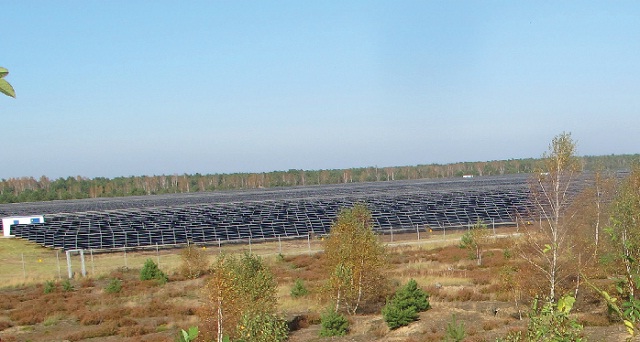
like the Lieberoser Heide solar plant near Drehnow. INDEPENDENT/RONALD MUSOKE
Germany’s climate protection plan says its industries should emit at least 22% less greenhouse gases in 2030 compared to 2014 by improving efficiency in production. With traffic responsible for 18% of all greenhouse gas emissions in Germany, one of the goals of the new climate action plan is to reduce greenhouse gas emission from cars by 40% until 2030.
Germany’s environment ministry has also been pressing for a regulation of cars to be included in the climate action plan with a suggestion that by 2030, all new cars must almost entirely be either electric or have climate-friendly engines.
According to a report by German international broadcaster Deutsche Welle, German car manufacturers including; VW, Audi, Mercedes and BMW have electric cars in their line-up but only 0.6% of all new cars sold in Germany in the first quarter of 2015 were electric cars. At the moment, there are barely 19,000 electric cars on German streets.
With the agricultural sector also being a key emitter of greenhouse gases, thanks to fertilizer use and animal cattle rearing—which is a key contributor to methane in the atmosphere— Germany’s Climate Action Plan wants to reduce greenhouse gas emissions in agriculture by 17% by 2030.
The plan focuses on reducing the application of fertilisers and the goal is to have 20% of all agricultural areas in Germany cultivated organically by 2030.
Marlene Micha, a lawyer who works in the Federal Ministry for the Environment, Nature Conservation, Building and Nuclear Safety’s National Climate Initiative says the German government is also supporting municipalities, schools, and businesses to tackle climate change. She says, over the last nine years, since 2008, the ministry has supported over 20,000 projects across the country at a cost of € 619m.
Powerful backers
The Energiewende programme has powerful backers like Fischer.
“Energiewende is deeply rooted in a deep consensus within German society and everyone is convinced about the human contribution to climate change,” he said, “Everyone believes that it is worth doing something about climate change because the consequences are grave.”
Fischer was speaking at a luncheon organised by the German Federal Office in Berlin on Oct. 18 for 14 climate change experts and journalists from 14 countries across five continents. They were from Bangladesh, Brazil, Kenya, Czech Republic, Hungary, Morocco, Nepal, Poland, Portugal, Serbia, Slovakia, Uganda , the US and Vietnam and were in the Lusatia region as part of the German Federal Foreign Office’s ‘Post COP21 Climate Policy for 2050 information tour’ to see firsthand the link between coal mining and climate change.
The Germans were happy to explain their slow but steady switch to renewable electricity produced from the sun and wind. Fischer dismissed the claim that the Germans’ fixation on ditching fossil fuels is “a romantic notion.”
“Germany’s Energiewende is a long term process and by the second half of the century, Germany will be 95% greenhouse gas emission free,” he said.
“The destination is clear but in getting there, sometimes we travel faster, and sometimes we travel slower, sometimes we go back,” he said. Eichhorn also dismissed claims that Energiewende cannot work.
“It is not a romantic German idea,” he said, “It is a hard economic necessity if we want to have a future for our children.
“We don’t pretend that we have found the solution for every problem; it is also a process from which we try and error, and we look to others to see what we can learn from them.”
Pegels agrees. She says political consensus is never a given.
“It is something that we have to struggle for everyday and that we have to convince people that the Energiewende is something we have and should do as a country,” she said.
 The Independent Uganda: You get the Truth we Pay the Price
The Independent Uganda: You get the Truth we Pay the Price





